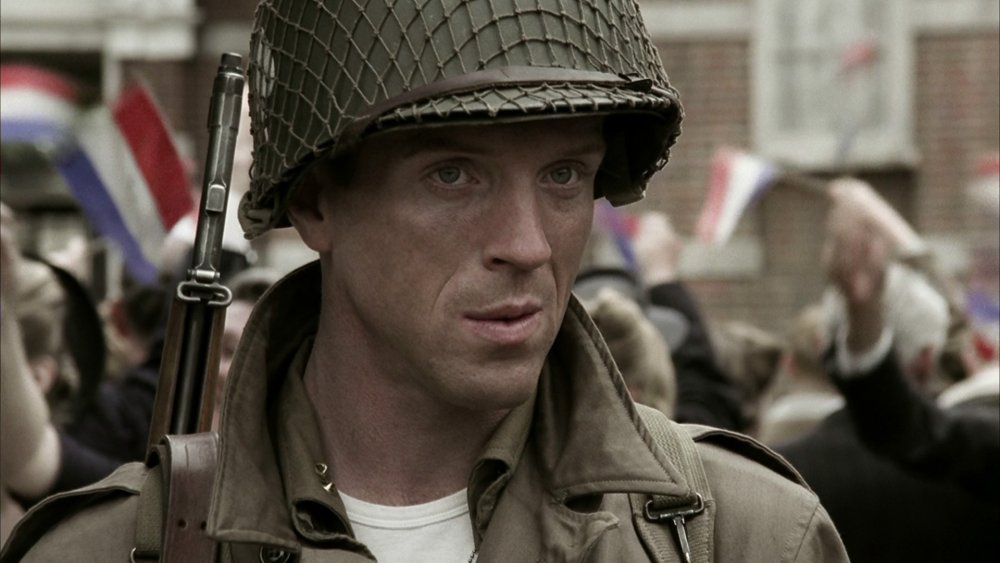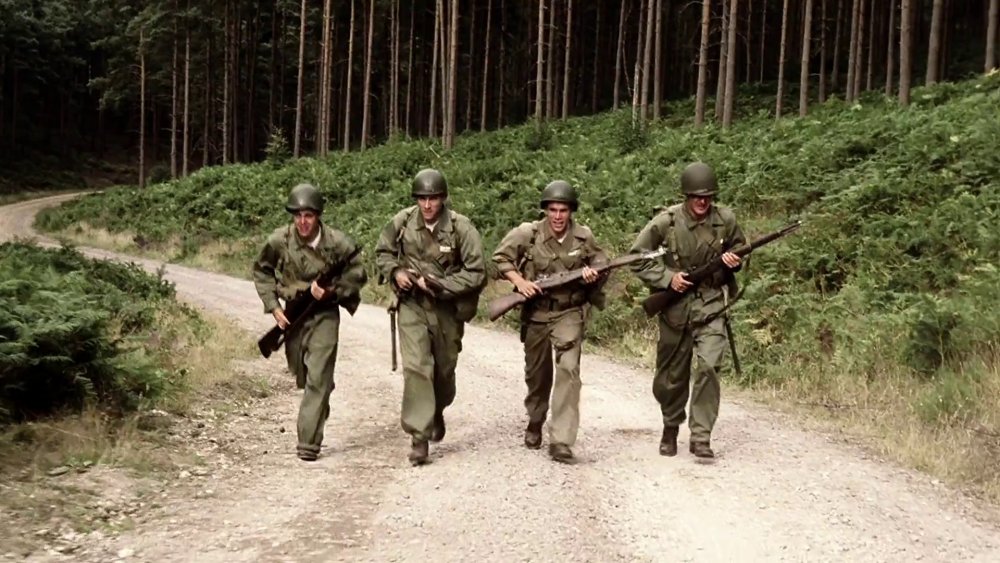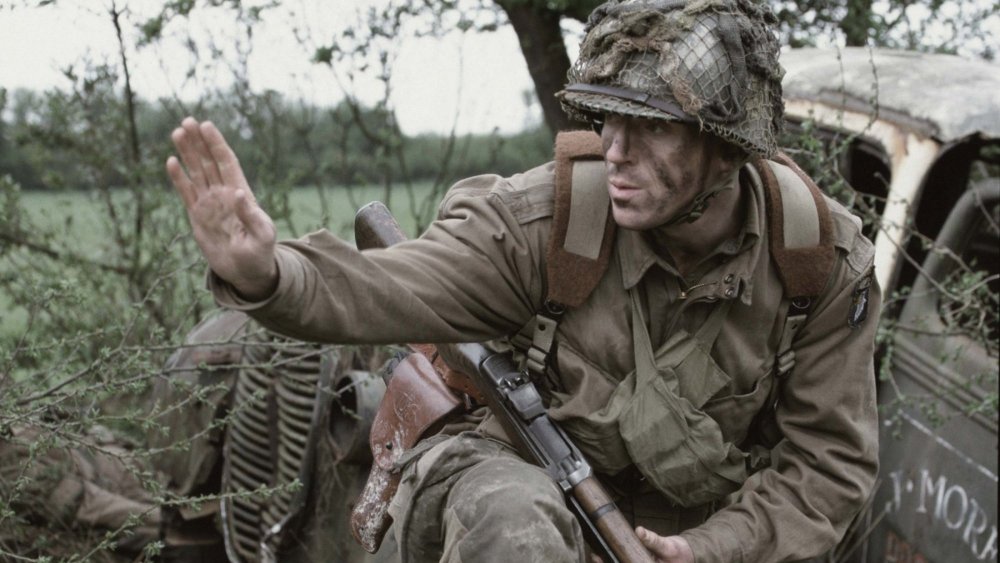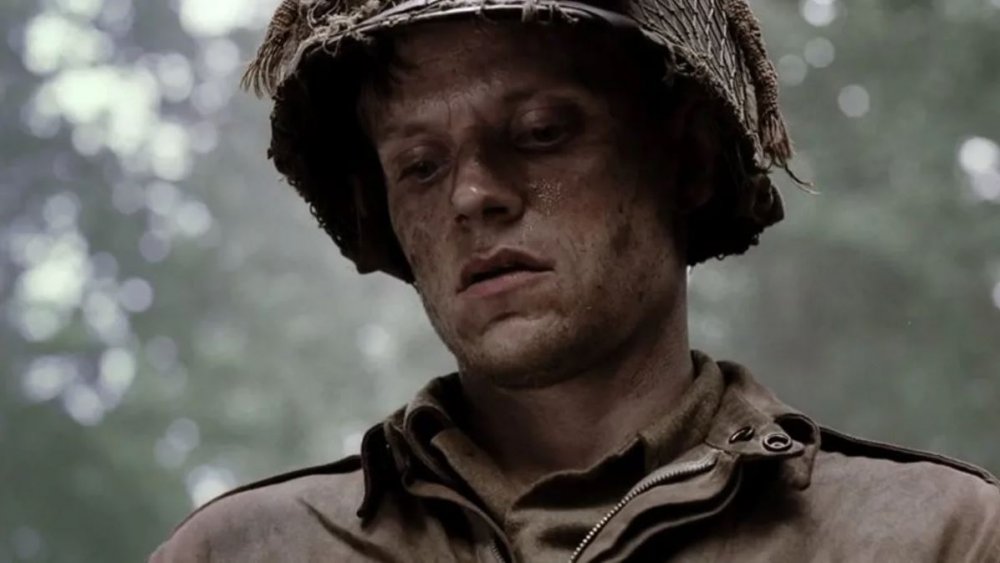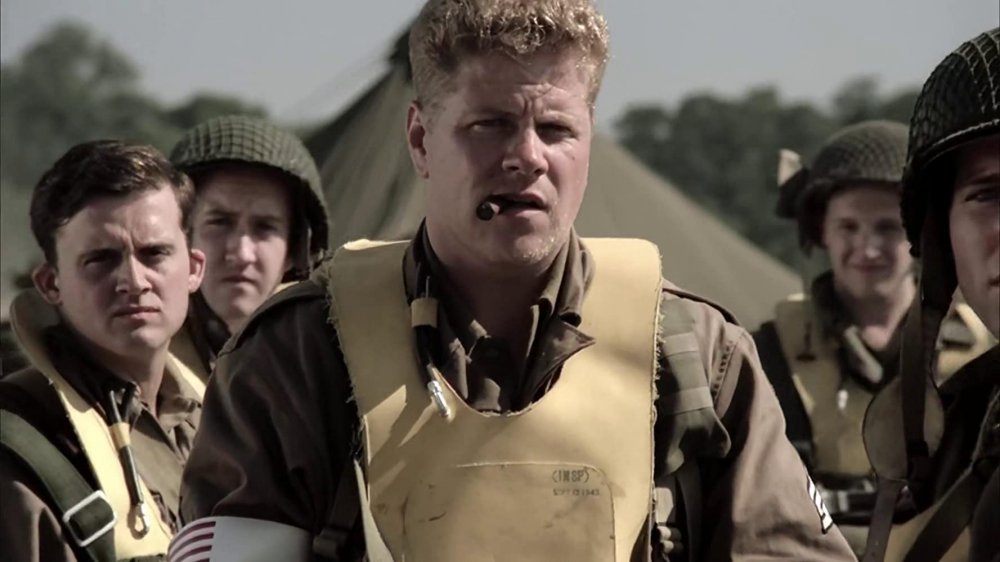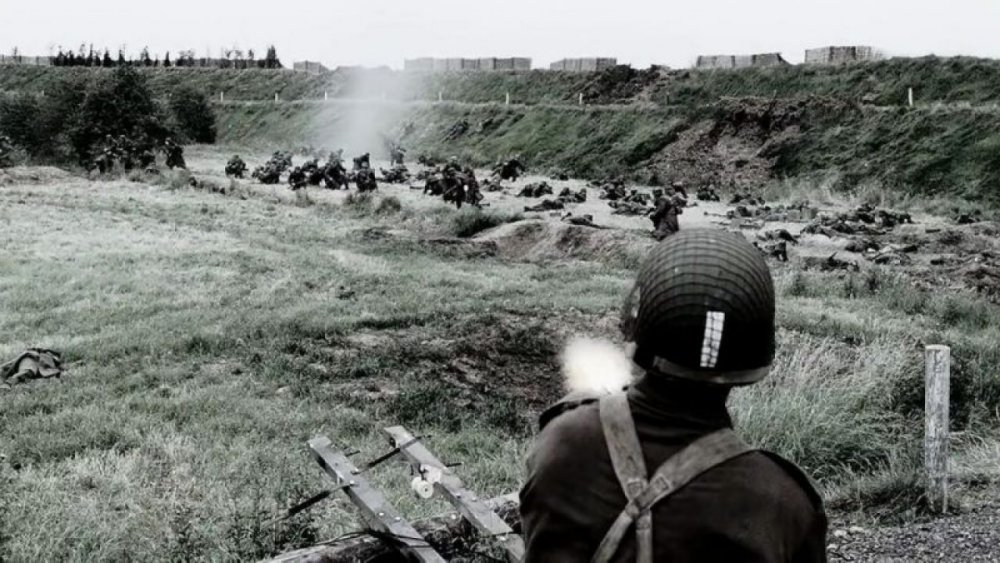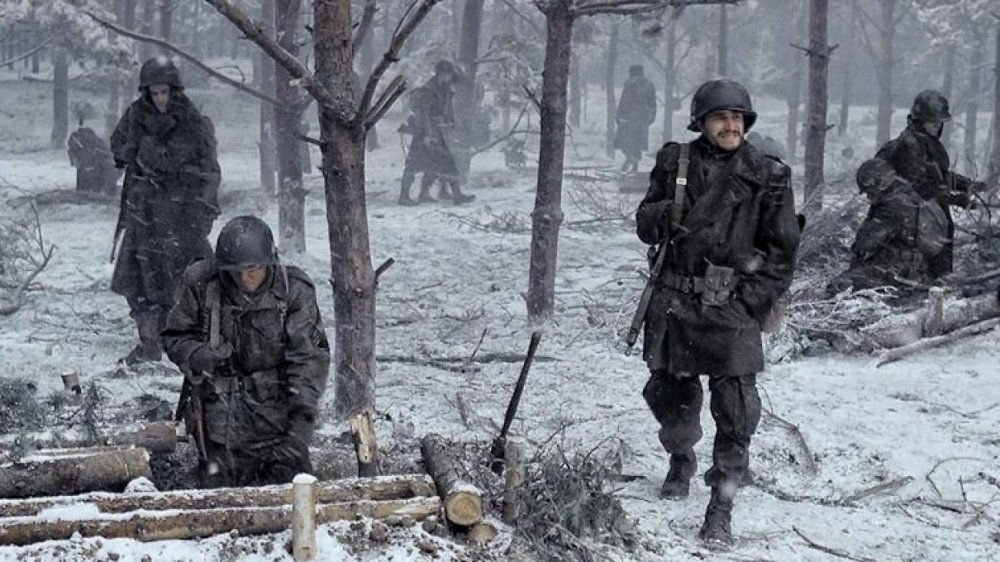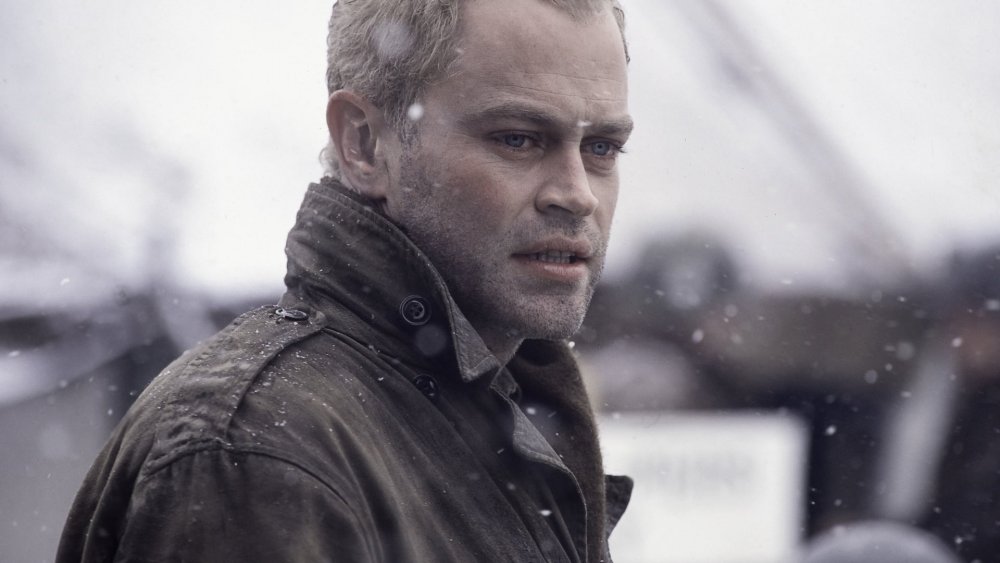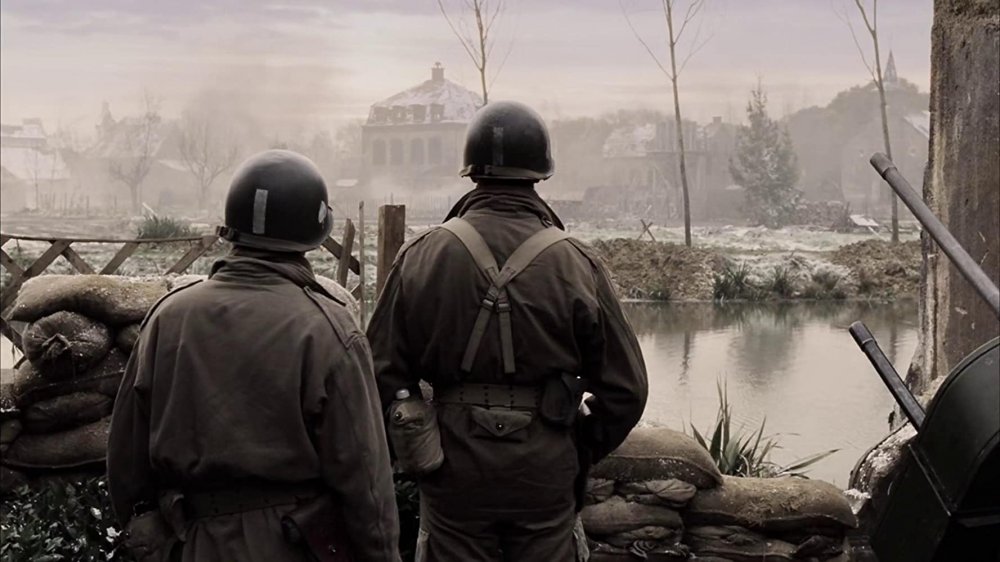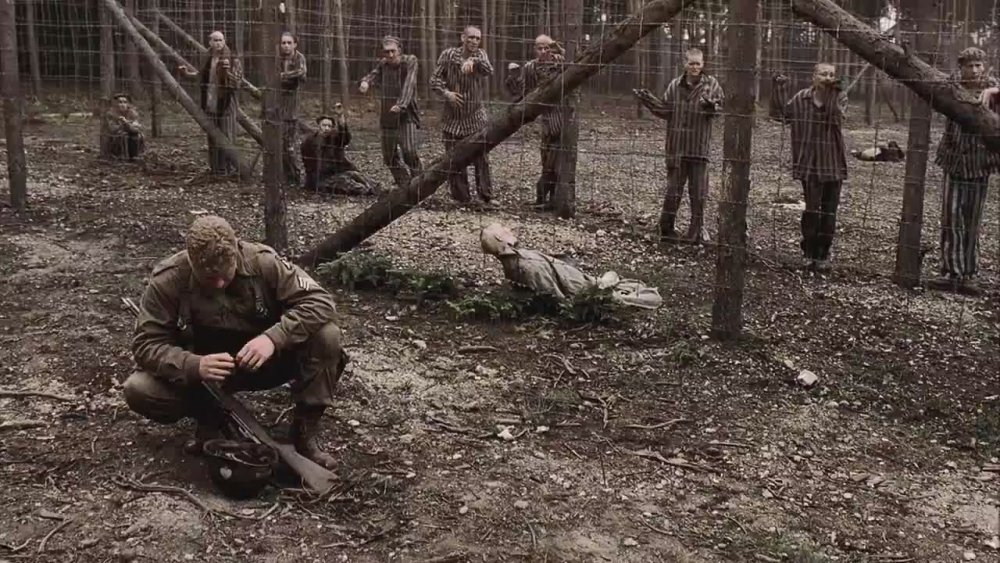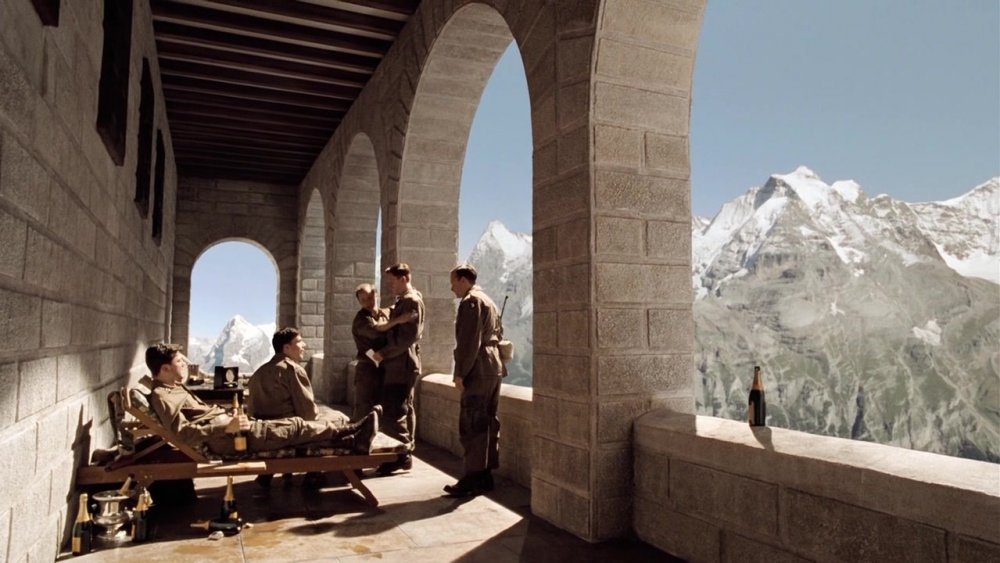The Band Of Brothers Timeline Explained
War-focused cinema has taken a variety of different angles and perspectives over the years. Films like 1917 provide incredible immersive experiences. Heroic flicks like Braveheart get everyone up on their feet, cheering like a band of Scottish clansman. And war movies like Saving Private Ryan excel at pulling on everyone's heartstrings. When it comes to portrayals of battlefield camaraderie, though, nothing holds a candle to Band of Brothers — it's in the name, for goodness sake.
The book to miniseries adaptation, brought to life by the joint efforts of executive producers Steven Spielberg and Tom Hanks, traces the dramatic exploits of Easy Company, a group of heroic World War II combatants from the U.S. 101st Airborne Division. The ten-episode series is filled with dramatic scenes, right from the moment the group begins to bond over vomited spaghetti in boot camp. From there, they continue to draw closer as they ship off to Europe and proceed to go through hell and back again as they help topple Hitler from power.
Due to its fraternal nature, the series bounces between a lot of different people, following a variety of familiar faces from one episode to the next. So we decided to finally sit down and trace Easy Company's collective path from one end of the series to the other. We tried our best to stick to the order of the episodes themselves to help things flow better. The result? The complete Band of Brothers timeline explained.
The Band of Brothers story gets started with Currahee
We kick things off way back in the 1940s. While the story technically starts right on the cusp of the D-Day invasion in early June of 1944, the narrative pretty quickly jumps back two years in time. From there, it follows the raw recruits of Easy Company as they begin their military training at Camp Toccoa, Georgia, under First Lieutenant Herbert Sobel.
Throughout the episode, we meet many soon-to-be-familiar members of the crew as they meet and collectively endure a trying period of training under the harsh, disciplinary eye of Sobel. The members of Easy Company initially go through basic training before participating in five practice jumps in order to receive their "jump wings" as paratroopers in the U.S. Army. From there, they continue with combat training exercises both in the U.S. and in England.
As this first chapter of the story plays out, Sobel's harsh training methods have a two-fold effect. On the one hand, the calloused demands of the officer help whip the men of Easy Company into exceptionally well-trained soldiers. On the other hand, they also serve to simultaneously make them loathe their commanding officer. On top of that, the lieutenant's ability to command in the field comes into serious doubt as he botches multiple training exercises and generally undermines his soldier's trust in his ability to lead them in battle. Eventually, with his NCOs (non-commissioned officers) protesting his leadership, Sobel is replaced as the commanding officer of the company, to the great relief of his men.
Winters proves himself in Day of Days
Leaving their first commanding officer in the dust, Easy Company proceeds to join in Operation Overlord. They make up part of the first wave of paratroopers that are dropped into German territory in order to soften the enemy up before the beach landings begin —and yes, those are the same landings that you see in the opening act of Saving Private Ryan. This initial invasion goes quite awry as countless paratroopers lose their weapons and gear in the drop and end up way off course, separated from their units.
The bulk of the episode follows Lieutenant Richard Winters as he links up with a variety of paratroopers, some from Easy Company and some not. Eventually, they reach a rendezvous point where a larger collection of paratroopers have gathered. Along the way, they discover that their new commanding officer, Lieutenant Thomas Meehan, has been lost in the action. At this point, Winters is ordered to select a group of soldiers and then take out a group of Nazi cannons that are bombarding the beaches.
The troop heads off to the location of the cannons, which are set up around a fortified French estate called Brècourt Manor. Once on-site, Winters demonstrates an incredible level of tactical battlefield skill as he lays out a textbook assault on the artillery, capturing the pieces with minimal losses.
Carentan takes a look at shell shock
After the successful D-Day invasion establishes an Allied foothold on mainland Europe, Easy Company, now under the talented leadership of Acting Commander Winters, finds itself heavily involved in the initial push away from the first landing points. As more paratroopers trickle in to swell their ranks, the company winds its way along with other units, towards the town of Carentan.
To their dismay, the town turns out to be heavily fortified, and the unit proceeds to take on everything from machine gun nests to snipers and artillery. Eventually, they capture the town after suffering heavy losses. From there, they move forward and encounter more heavy fighting until they're eventually pulled off of the front lines. The episode also introduces Lieutenant Speirs, a stoic officer with a nearly mythical reputation for fearlessness in battle and cold-hearted murder.
Throughout this point in the story, the narrative particularly follows one Private Albert Blithe, a shy soldier who's forced to face his fears on the battlefield. After suffering from "hysterical blindness," he eventually overcomes his case of shell shock and boldly joins in some of the most dangerous fighting, only to be shot in the neck and evacuated shortly afterward. Interestingly, one of the main faux pas in the show involves Blithe, as the series claims that the private died of his wounds in 1948. In fact, he actually recovered and went on to have an exemplary military career — including over 600 parachute jumps — before dying in 1967, while still on active duty. He was even buried in Arlington National Cemetery with full military honors.
The Allies face a major setback in Replacements
After the weeks spent in France following the D-Day invasion, the story quickly moves forward a few months to the fall of 1944. The episode "Replacements" follows Sergeant Denver Randleman, an Easy Company officer who's tasked with leading many of the replacements that have arrived to take the place of the fallen.
The boys of Easy Company are informed that they'll be taking on an important role in the upcoming campaign known as Operation Market Garden. Replacements and veterans alike are briefed on the joint British/American operation before they parachute quietly into Holland in mid-September. Their initial target, the liberation of the Dutch city of Eindhoven, goes off without a hitch, and the crew is given a hero's welcome.
However, the initial success doesn't last long. If D-Day had started rough and ended with success, Market Garden more or less flips the formula on its head. After a peaceful start, the Allied forces run into stiff resistance in the town of Nuenen, where they're eventually forced to retreat. Here, the episode's protagonist is wounded by shrapnel and is forced to hide overnight before eventually reuniting with the rest of Easy Company.
Even though Randleman makes it out alive, the hopes that Operation Market Garden would bring a quick end to the war ultimately prove empty, and Easy Company is forced to prepare for the next challenge on the long road to success.
Band of Brothers slows things down with Crossroads
The fifth episode of the series, "Crossroads," picks up in the aftermath of the failed Operation Market Garden situation. With hopes of a quick end to the war stalled out, the mid-series installment slows the pace, bouncing between various events and instilling a heavy dose of flashbacks.
It mainly focuses on Winters, who spends a chunk of his screen time writing a report of a battle over a heavily defended crossroads a few weeks earlier. A good portion of the episode hinges on Winter's haunting memory of the skirmish. While beautiful in its delivery, the scattered feel of the episode has the effect of making a clear reading of the timeline difficult. However, if you piece things together, it appears that while Winters is recounting events that happened in early October 1944, the real-time events seem to pick up during Operation Pegasus in mid-October.
Throughout the episode, a great deal of inner struggle and ethical reckoning takes place. This is set to the backdrop of the soldiers of Easy Company getting a breather between the various operations that they've been involved in. This also marks the point where the gifted Winters is promoted right out of his command and moved away from Easy Company's beloved band of brothers. As the installment ends, the company is being hastily relocated to a small town called Bastogne.
Things get incredibly grim with Bastogne
At this point in the story, it gets a bit difficult to keep track of the greater timeline. While dozens of skirmishes and several major offensives have taken place, Easy Company hasn't really been on the front lines for long. In fact, it's been less than six months since they joined in the fighting with their "baptism in fire" in the D-Day invasion. The company has spent roughly half a year in mainland Europe, and it's now, outside of the sleepy town of Bastogne, that their worst experience begins.
As the year winds down, Easy Company quickly finds themselves neck-deep in the desperate Battle of the Bulge. Historically, the fight is a barn burner, as it's the last-gasp attempt by the Germans to gain some offensive momentum. For the boys of Easy Company, it's also one of the most traumatizing events of the entire war.
The sixth episode traces out the early days of the battle as it follows a medic named Eugene "Doc" Roe. The soldier spends his time running between snow-covered fox holes as he patches up wounded soldiers and scrounges for supplies. He bonds with a nurse in the midst of the chaos, but she ends up being killed, underscoring the desperate situation. Between the snowy weather, the defensive posturing, and the pressure of limited resources, this episode marks a low point in Easy Company's fortunes. Nevertheless, the group holds their ground, and they eventually help to turn back the German assault.
Morale is pretty low in The Breaking Point
While Easy Company survives the harrowing events of the initial German attack in Battle of the Bulge, it turns out that they're not out of the woods yet. As they hunker down around Bastogne and continue to endure the punishing European winter, the situation begins to deteriorate, and many of the men of Easy Company begin to break down under the pressure.
This part of the story is narrated — quite literally — by First Sergeant Carwood Lipton, who explains the situation throughout the seventh episode. Through Lipton's eyes, we see the paratroopers' morale steadily decline as they're pinned down under a series of stunning artillery barrages that, among many other casualties, seriously wound series regulars Joe Toye and Bill Guarnere. The experience also leads Lieutenant Buck Compton (pictured) to break down under the pressure.
The episode crescendos with an attack on the town of Foy itself in mid-January 1945. Led by Winters' incompetent replacement, Norman Dike — who freezes minutes into the fighting — Easy Company is initially left spinning its wheels as their attack stalls out. However, it's at this point that Lieutenant Speirs shows up again, taking command of the company and leading them forward to victory through his reckless heroics.
The show nears the end with The Last Patrol
"The Last Patrol" is where we finally begin to see that the end of the war is in sight. As Easy Company comes down from the emotional highs of the Bastogne affair, they find themselves moved to Haguenau near the French-German border. By now, it's mid-February, and the attitude throughout the entire company leans towards apathy and self-preservation, as everyone begins to shift from "get 'er done" mode to more of a "how can I survive this and get home in one piece" mentality.
The main character this time is Private David Webster, who returns to the company after a lengthy recuperation in an Army hospital behind the lines. While he's initially greeted coldly, due to his tardy return leading to his absence from the Battle of the Bulge, he ultimately finds his way back into the affections of his fellow soldiers.
Meanwhile, the rest of the events of the episode recall a dangerous patrol that Easy Company is ordered to execute in search of important intelligence. While the operation is successful, a man is lost in the fighting, and the soldiers continue to show their increasing distaste for activities that cost lives with the inevitable end of the war so near. In response, Winters, who's been ordered to send a second patrol, informs his men that they won't be sent out a second time. Instead, he'll fabricate a report in order to both please his higher-ups and avoid the need for his men to stick their necks out unnecessarily.
Band of Brothers reminds us Why We Fight
The penultimate episode in the series jumps forward to mid-March, 1945. Easy Company is officially in Germany at this point, and the Nazi forces are beginning to crumble. Events are portrayed through the perspective of a dejected Captain Lewis Nixon, who's feeling the combined pressure of higher command, a dysfunctional personal life, and a significant drinking problem.
After overseeing the surrender of 300,000 German soldiers, the group stumbles onto their first experience of one of the great tragedies of World War II — the Holocaust. Outside of a German town, they find a camp filled with emaciated prisoners. As the horror of their discovery dawns on them, they begin to scramble to collect food and medical supplies for the survivors of what is clearly a concentration camp.
After dealing with the immediate needs of the inhabitants, the company oversees the cleanup of the camp, with the labor being provided at gun point by the German citizens of the closest town. It's also worth mentioning that the episode begins with the death of President Franklin D. Roosevelt and ends with the death of Hitler, heralding a distinct shift from the day-to-day fighting narrative as the series begins to focus on the more sobering aftermath of the war.
The Band of Brothers timeline comes to an end with Points
The series finale wraps things up in as fitting a manner as possible. Early on, Easy Company captures the Nazi stronghold known as the Eagle's Nest. Soon, Germany surrenders, and the remnants of the once-mighty Nazi war machine are mopped up by the Allied forces.
The soldiers soon find themselves dangerously bored as they wait to be sent home or transferred to the Pacific theater of the war. The episode once again follows Winters as he observes the various negative elements that accompany soldiers with too much time — not to mention booze — on their hands. Eventually, word arrives that Japan has surrendered as well, and the story slowly winds to a close.
Of course, with so much of the narrative coming directly from personal experiences, the series wouldn't be complete without a montage outlining what happened to the survivors of Easy Company after they returned home. Some of these stories are happier, others sad, but all of them reflect the down-to-earth, real-life men that served in the war and sacrificed so much of themselves as they bonded into a truly indomitable band of brothers.
